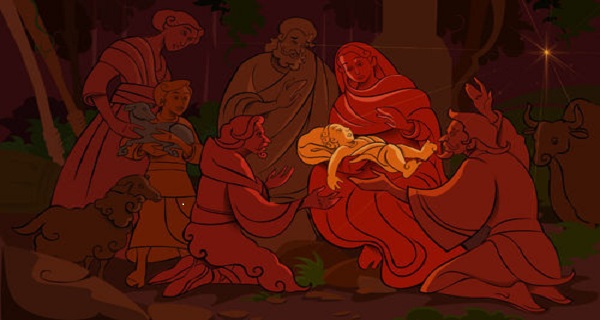Christmas; Is There Truth In The Tradition?
“It’s Merry Christmas, not Happy Holiday!”
“Let’s not forget the TRUE meaning of Christmas!”
“Keep Christ in Christmas!”
These declarations have become common mantras argued throughout the Christmas season. And even in this time of “peace on earth, good will toward men” many of us can become rather incensed as we endeavor to preserve or eradicate those assertions. But, if you happen to be a Christian, then you seem to have an inherent responsibility to defend the true “reason for the season” – at least, according to us Christians – the birth of the Christ!
But, are Christians truly preserving something holy and sacred as we celebrate Christ’s “birthday” or are we perpetuating something that could actually be an abomination to God? As Christians, we are familiar with the concept of shining a light (Truth) into dark places to make the enemy flee. Lets’ shine a light on the topic of Christmas and see what scurries out from the shadows.
Like most of you, I love gathering with family and friends during the Christmas season. I enjoy listening to outdated Christmas tunes while reminiscing about Christmas seasons gone by. I especially love seeing the joy on my children’s faces as they tear into their gifts on Christmas day. But, unfortunately, all that I love about Christmas ends there. I am certain that the list of the things you love about Christmas would dwarf mine and we could spend all day discussing the merits of the holiday. But, that doesn’t’ negate the fact that there is a great deal to dislike about Christmas.
Over the years, I have cultivated a healthy disdain for the crass commercialism and unabashed mass marketing that accompany the Christmas season. The fact that the simple act of gift-giving has degraded into a brutal buying frenzy in which “good will toward men” is abandoned for an exasperating quest for the perfect amount and types of gifts has also sullied the holiday for me. So has the idea that most businesses take the occasion to reap over half their yearly profits during this “most wonderful time of the year” on the backs of the American consumer through a shameless barrage of advertisements that either glorify greed or generate guilt or both. Add to these the fact that, for most, Christmas comes with increased stress and depression as well increased debt. And it doesn’t end there. As almost half of us will spend more than we can afford this Christmas, nearly a quarter of us will be faced with the dilemma of choosing between paying the bills or buying Christmas gifts for our children.
Let’s be honest, the joy of the Christmas season can easily be overshadowed by it’s many negatives. In fact, if we remain completely honest with ourselves, we can’t help but conclude that the Christmas season actually brings more dread than delight and more grief than good cheer. It’s then that most Christians will say, “That’s why we need to put Christ back into Christmas!” But, the question at that point is, how can we put Christ back into something He was never in to begin with?
Through the centuries, we Christians have tried to “redeem” this holiday by fabricating our own innocuous meanings behind the various traditions we observe during the Christmas season. Fabrications such as the Christmas tree representing the tree on which Christ died, the star on the tree representing the star the wise men followed, the gifts representing the gifts given by the wise men, the candle in the window representing Christ’s light shining in the darkness. The fabrications and variations of those fabrications are virtually limitless. That fact, in and of its self, should give any Christian pause. But, it gets worse. Not only are our beloved Christmas traditions not truly Christian, they are actually pagan. And the more closely we examine the true origins of Christmas, the more evident it becomes that maneuvering God’s people to hold a celebration of the birth of the Son Of God on the very same day that pagan religions around the world celebrated the birth of the sun god and other demonic deities was most certainly a move by Satan to have the creation offend our Creator.
For example, Persia, Babylon, Rome, Egypt and Greece are only a few of the vast number of ancient civilizations that valued December 25th as a holy day in honor of the their sun gods. Pagan religions worldwide share a common tradition of holding birthday celebrations for their gods on this day; seeking out spirits and paying homage to their own gods while participating in all forms of debauchery. This date, however, is most certainly NOT the birth date of the Messiah, being that the Christ was born during a time of year in which it would have been warm enough at night to pasture sheep. See Luke 2:8-11.
Moreover, pagan religions have always enjoyed the longer nights preceding the Winter Solstice as the best time to practice their dark arts. For instance, according to ancient Norse tradition, a 12-day celebration leading up to December 25th was held in honor of one of their gods named Yule. One of the traditions associated with the celebration involved acquiring a large log from the forest to be deemed the “Yule log”. According to tradition, the Yule log was set aflame and was kept burning during the 12 days of Yule. During this time, animal or even human sacrifices were offered to the flames each night in an attempt to make contact with Yule and the spirit realm. This wickedness was accompanied by constant drunkeness and delirious reveling. Continuing with the Yuletide traditions; the custom of candles being placed in windows comes from the ancient Norse practice of placing candles in the windows of their homes to signify that they were celebrating Yule. Now days, when we celebrate the Yuletide with Yule logs, candles and songs that suggest that we “make the yuletide gay”, we are invoking the name and power of the pagan god, Yule.
Holly has long been used in ancient traditions to ward off evil spirits. Decking the halls of a home with boughs of holly and evergreens was an ancient pagan means by which to invoke the powers of the “nature gods”. Forming these greens into a wreath is said to accentuate their power. This tradition of decking the halls with such flora was supposedly useful for keeping evil at bay. Not only is this a pagan superstition, but as Christians, we are to derive our spiritual protection from our Holy Father and nowhere else.
Mistletoe is traditionally used in the dark arts. It supposedly renders women helpless to sexual suggestions and exploitation. This is where the tradition is derived that a woman must kiss anyone who crosses beneath a mistletoe with her. Granted, this is a seemingly innocuous tradition, but it is rooted in witchcraft and therefore has no place in anything to do with God.
Evergreen trees represent sex and fertility in pagan traditions. During the season of the Winter Solstice, an evergreen tree would be cut down and erected in the home. It would then be decorated and worshipped as a supernatural source of blessing. In most ancient pagan cultures, a star was placed on the top of the tree in homage to their pagan sun god. This pagan custom holds far too many similarities to our modern tradition of erecting a Christmas tree in our homes. Can we truly hold out any hope that God is pleased with that?
“…Learn not the ways of the nations nor be dismayed at the signs of the heavens because the nations are dismayed by them, for the customs of the peoples are vanity. A tree from the forest is cut down and worked with an axe by the hands of a craftsman. They decorate it with silver and gold; they fasten it with hammer and nails so that it cannot move”. Jeremiah 10:2-4
Granted, one could argue hermeneutics for this passage, but would the opinion of God toward these paganistic traditions change from people to people or from one point in time to another?
Santa Claus as we know him today is an amalgamation from many different cultures. But he got his start with the legend of a Germanic hearth god who, on or around December 25th, would dress in red and come down the chimneys of homes to reward those who had pleased him during the year or to curse those who displeased him. Granted, some will argue that the historic 4th Century Catholic Bishop, Nicholas of Myra, was the pattern for our modern-day Saint Nick because of Bishop Nicholas’ affinity for secretly leaving coins in the shoes of those who sat them outside their door. The similarity – if one could call it that – ends there, however, leaving no doubt that the origins of Old Saint Nick are pagan, not Catholic. But, beyond this, we must also consider the fact that, in order to perpetuate the tradition of Santa Clause, parents have to purposefully lie to their children for years. Not only does this plant seeds of doubt and create disappointment in those children, this can make them question whether other things we tell them that may seem a bit otherworldly to them – such as the story of the Son of an all-knowing, all-powerful God leaving heaven to come to earth die for a world full of wretches – are true.
Continuing with the topic of giving gifts; the act of gift giving actually originated with the Roman Emperor, Aurelian, in the 3rd Century. He ordered the exchange of gifts on December 25th to honor their sun god, Sol.
As Rome conquered Europe, it spread it’s pagan traditions throughout the territories. Their Winter Solstice celebration, Saturnalia, became known as the “Festival Of Fools” in Britain. In the 4th century AD the church of Rome, unable to reign in the popularity of this pagan celebration, chose instead to adopt it into Christianity, thinking that they could “redeem” the holiday and use it to attract more potential new Christians into their fold, at which point, they could then turn them from their pagan ways. Up to this time, the birth of Christ had never been celebrated. The church, nonetheless, adulterated scripture and chose to celebrate Christ’s birth. Worse yet, they chose to celebrate it on the same day as other pagan gods births were celebrated.
After that, the Festival Of Fools became known as Christ’s Mass, but only the name had changed. The debauchery and lawlessness associated with the celebration did not. Finally, in 1652, the celebration of Christ’s Mass had reached a fevered pitch. As a result, it was ceremoniously outlawed in England. The ban, however, had little effect. Celebrations continued unabashed and underground until 4 years later when a strong public outcry in favor of celebrating Christ’s Mass finally gained a foothold and the ban was lifted. This was one of the reasons the Puritans headed to the New World.
It was in the New World in 1659, that the American colonies placed their own ban on Christ’s Mass and for over 200 years the clergy in the New World was able to keep the celebration in cessation. But, the turn of the 19th century saw Christ’s Mass celebrations begin to grow in popularity. In 1828 riots, protests and celebrations during Christ’s Mass became so depraved that many American cities had to organize their own police forces for the first time in American history simply to handle the unruly merrymakers. By the mid 19th Century, American churches were the last remaining bastian against these practices. But, thanks to the efforts of The American Sunday School Society, that soon ended.
The American Sunday School Society began pushing Christmas programs for children as a means of filling the pews. They argued that the children would be learning about God through reenactments of the nativity and parents would be more likely to go to church, bringing friends and extended family to watch their children in the play. Sound familiar? They even began offering candies and treats to the children in an effort to entice Christian families into accepting the holiday. Finally, by 1890 all states had officially voted to celebrate Christmas and we as a nation formally began “honoring” our God with this paganized, greed-driven holiday we now know as Christmas.
To this day, many Christians believe that God somehow condones and perhaps is even pleased with the fact that we attempt to honor Him with holidays like Christmas and Easter, despite the pagan customs and traditions behind them and intermingled with them. But, in attempting to ascribe our human reasoning to an unfathomable God, we make a grave error. In fact, in Deuteronomy 4:2 God gives us some insight into His mindset. In this passage, He makes it clear that people are not to add to or subtract from His word. From this we can surmise that we are to only do for Him what He commands – not what we think might please Him. This understanding is supported further in Deuteronomy 12:8 when God warns that people should not do what they believe to be right in their own eyes. Deuteronomy 12:2-4 and Leviticus 18:30 also serve to corroborate the concept that Christians should be careful in choosing which traditions they observe.
Again, I don’t believe that hermeneutics can be argued here. God may have been speaking to a different people at a different time, but we can be certain God’s attitude toward these types of things has not changed in the least; especially since we have Luke 22:19 to tell us what to do in remembrance of Christ and 1 Corinthians 5:8 tells us how we are to celebrate Christ – in sincerity and TRUTH. So, at this point, ask yourselves this; how much sincerity and truth there is in the Christmas holiday with it’s pagan origins and it’s considerable emphasis on greed, vanity and materialism?
Charles Spurgeon, known as the “Prince Of Preachers”, had this to say of Christmas in his speech condemning the observation of the holiday on Christmas eve in 1871.
“We have no superstitious regard for times and seasons. Certainly we do not believe the present ecclesiastical arrangement called Christmas: first, because we do not believe in the mass at all, but abhor it, whether it be said or sung in Latin or English and secondly, because we find no scriptural warrant whatsoever for observing any day as the birthday of the Savior, and consequently, it ‘s observance is a superstition, and not of divine authority.”
So, should we keep Christ in Christmas? Can we Christians in good conscience consider Christmas to be a holiday that honors God or should we seek to separate ourselves from that notion? Have we really redeemed the holiday for Him or have we – like so many before us – simply justified it for ourselves? Does Christmas truly bring people to the Lord or does it mainly paint an inaccurate picture of Him; one that is essentially unappealing to those seeking the one true God? Can we point to an example or a command or even an inference in the Bible where Christians had redeemed and dedicated anything to God that had anything to do with pagan idolatry? It can easily be argued that the world – and even we Christians – have contaminated the holiness of our Sovereign God through the celebration of this predominantly perverse holiday. In fact, when taken in from a broader perspective, even the most devout advocate of Christmas is eventually forced to admit that, all in all, Christmas is more of a mockery of God than a veneration of Him
Reverend Cotton Mather, a socially and politically influential Puritan minister and prolific author of the 18th Century posed this question in a speech on the topic of Christmas in 1712.
“Can you, in your conscience think that your Holy Savior is honored by hard drinking, lewd reveling, and by a Mass fit for none but Bacchus or Saturn?”
Imagine for a moment that you have finally asked the love or your life for her hand in marriage. She delightfully accepts, and excitedly begins to plan both the marriage and your lives together. HOWEVER…
She wants you to die and cut your hair to look more like the style her old boyfriend used to have because “his hair always looked so good!”
She wants you to start wearing Jovan Musk because her old boyfriend used to wear it and she “always loved the way he smelled! “
She wants the colors of the wedding to be blue and yellow. She loves yellow and her old boyfriend loved blue. Plus, “he always looked so good in blue!”
She wants the wedding song to be “Now And Forever”, by Richard Marx. That was their favorite song because it was playing the night she and her old boyfriend first kissed.
Oh, and one last thing, your birthday being in the middle of January is such a bummer; it’s cold and nasty out. Perhaps you could change when you celebrate your birthday to sometime in June and you both could celebrate it in the Bahamas like she and her old boyfriend used to?
Do you think you would be comfortable in that type of relationship? Would it make you wonder just how much your bride-to-be loves you and whether she has truly forsaken all others? No one would want to be in a relationship like that – and neither does God. We Christians are His bride-to-be. And when we bring our worldly loves, and pagan customs into our relationship with God, he does not feel honored and He does not feel loved.
By now, the thought has likely crossed your mind that it doesn’t matter to you that the origins of Christmas and all of our cherished traditions are supposedly pagan. It doesn’t matter that the holiday is materialistic and decadent. None of those things matter because, to you, those things are not what Christmas means. You are sincere in honoring God in the way that you do during Christmas and you know in your heart that He will respect that. But, we must remember, we can’t always trust what we feel in our hearts as we are warned in Jeremiah 17:9. We also need to keep in mind that we can be sincere in what we do or believe and simply be sincerely wrong. Can the creation choose how to worship the Creator? Perhaps we should simply resign ourselves to conducting our lives the way God has instructed us to because He is God and we are not even close. And with that in mind, we need to realize that it doesn’t matter what Christmas means to us, it only matters what it means to Him. And from what we can determine from the scriptures, it is certain that He detests Christmas despite our most noble and well-meaning efforts to Christianize it
Still, we deck our halls, our houses and our lawns with pagan symbolism and take part in pagan customs as we lie to our children and ourselves about the Christian origins behind them all. We take part in the greed and the gluttony and the veracious vanity of Christmas as we attempt to force Christ into a debauch debacle that – not only was He never in to begin with – but He wants no part of now.
No, I am not advocating taking Christ out of Christmas, per se. As Christians, we are to put Christ into everything we do. But, peace on earth, good will toward men, the birth of a Savior, a giving heart, love, peace, joy and hope; all the things that Christmas means to us Christians should, first of all, not be limited to once a year. Secondly – and most importantly – to perpetuate the lie that Jesus is the “reason for the season” is to associate our perfect God with with the paganism, materialism, lies, greed and chaos that is Christmas. Because, for all the effort we Christians have put into Christianizing this holiday, it remains, for the most part, the same mockery of all things Christian that it ever was. It indeed remains a Festival Of Fools.










